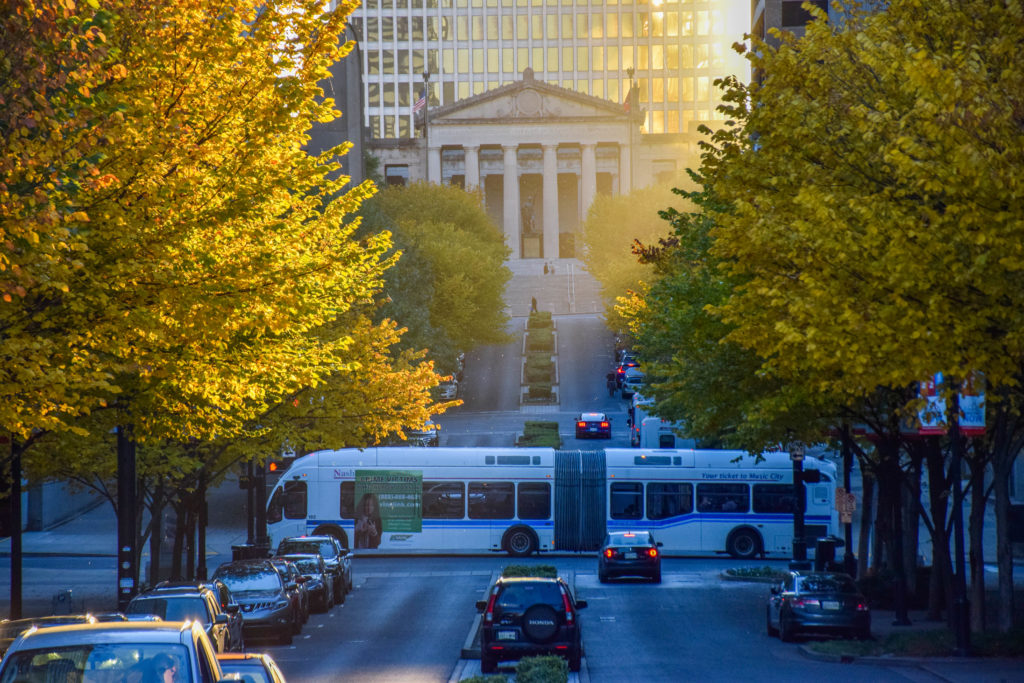
Among the biggest cities in the U.S., Nashville stands apart because it lacks a dedicated tax to fund transit. Establishing one would likely mean a ballot referendum, put forth by the mayor and decided on by voters.
Both mayoral finalists have said they plan to do this.
There’s some common ground. Both Freddie O’Connell and Alice Rolli say they’d get started on a transit referendum right away.
O’Connell says his administration would start working on the idea on “day one.” Rolli has suggested the extremely ambitious timeline of taking a referendum to voters as early as next year.
Both say they’d take advantage of the state’s IMPROVE Act. This allows counties to go to voters with a ballot measure to raise select taxes to fund transit.
Nashville voters haven’t seen a transit referendum since 2018, when they cast ballots on the multi-billion-dollar mass transit plan proposed by the Barry Administration. It failed spectacularly.
So, O’Connell and Rolli are thinking about how they could try again.
Lessons from the last time around
“I would expect to be very intentional about having the community conversation about when and whether we should do this, starting on day one,” O’Connell says. “I think that it’s one of the top issues I heard about … transit it very popular. I think the two most important ingredients for whether this is successful are: Where is the community on this? And what are the details of the plan?”
O’Connell says he sees three big takeaways from the 2018 referendum’s failure:
“One, no one expected a billion-dollar tunnel under downtown.”
“Two, I think there was a lot more emphasis on light rail than most people — including me as a former transit authority board member — were expecting.”
“And three, I think there was a lot of criticism that it was not a regional plan.”
O’Connell says that if Nashville took the lead on establishing a mass transit plan, it would be easier for neighboring counties to “hook into” the city’s system later on.
Rolli agrees with O’Connell that the last referendum had flaws — especially on the latter point.
“In 2018 we took a go-it-alone approach,” she says.
By “alone,” Rolli means she, too, would prefer a regional plan. She emphasized the connections she’s forged with neighboring mayors.
In 2018, mayors from multiple surrounding counties spoke strongly in favor of Nashville’s referendum, including voicing support at Metro Council public hearings.
High costs
But all of this would require taxes.
O’Connell wants to figure out the right amount.
“I think the sheer cost of that 2018 plan gave a lot of people in the government, including me, a little bit of sticker shock,” O’Connell says. “And I think one of the important goals here is going to be to make sure that if we do this, we don’t go beyond some of the boundaries that I think are pretty reasonable.”
He mentions some numbers: Nashville has the option to go up to a 9.75% sales tax, and he sees this as nearing the limit.
“We should never go above 10% for something like that,” O’Connell says. “There are a lot of opportunities to reduce cost.”
This is where O’Connell and Rolli deviate.
Rolli signed the “Taxpayer Protection Pledge,” and has made it a central part of her campaign messaging that she won’t raise taxes.
In an early campaign ad, she declared: “I’m the only candidate who’s pledged not to raise taxes, because Nashville families know best how to spend their hard-earned dollars.”
But, a transit referendum, like she’s proposing, would mean a tax — and Rolli notes it likely would be a sales tax.
So, how do these anti-tax and pro-referendum messages line up?
In a statement to WPLN News, Rolli says that because voters would be deciding on the referendum, it would voters raising taxes, not the mayor.
She says she would take cues from the transit advocacy group Moving Forward.
“They have a plan,” Rolli says. “And the single most important thing for the next mayor is to get busy securing the dedicated funding so that we are not putting Davidson County taxpayers at a disadvantage.”
Voting information
Early voting is now underway at twelve polling places across Davidson County. Election Day is Sept. 14.

